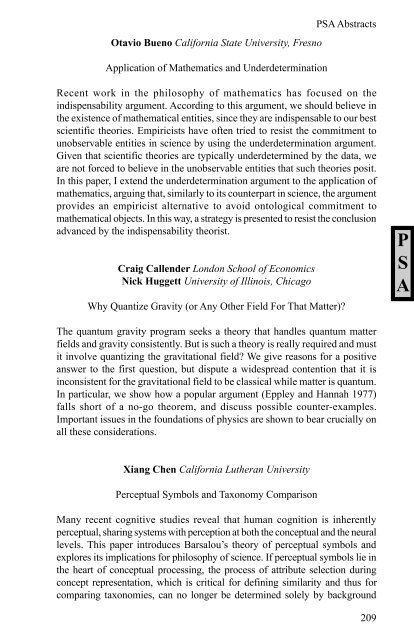2000 HSS/PSA Program 1 - History of Science Society
2000 HSS/PSA Program 1 - History of Science Society
2000 HSS/PSA Program 1 - History of Science Society
You also want an ePaper? Increase the reach of your titles
YUMPU automatically turns print PDFs into web optimized ePapers that Google loves.
Otavio Bueno California State University, Fresno<br />
Application <strong>of</strong> Mathematics and Underdetermination<br />
<strong>PSA</strong> Abstracts<br />
Recent work in the philosophy <strong>of</strong> mathematics has focused on the<br />
indispensability argument. According to this argument, we should believe in<br />
the existence <strong>of</strong> mathematical entities, since they are indispensable to our best<br />
scientific theories. Empiricists have <strong>of</strong>ten tried to resist the commitment to<br />
unobservable entities in science by using the underdetermination argument.<br />
Given that scientific theories are typically underdetermined by the data, we<br />
are not forced to believe in the unobservable entities that such theories posit.<br />
In this paper, I extend the underdetermination argument to the application <strong>of</strong><br />
mathematics, arguing that, similarly to its counterpart in science, the argument<br />
provides an empiricist alternative to avoid ontological commitment to<br />
mathematical objects. In this way, a strategy is presented to resist the conclusion<br />
advanced by the indispensability theorist.<br />
Craig Callender London School <strong>of</strong> Economics<br />
Nick Huggett University <strong>of</strong> Illinois, Chicago<br />
Why Quantize Gravity (or Any Other Field For That Matter)?<br />
P<br />
S<br />
A<br />
The quantum gravity program seeks a theory that handles quantum matter<br />
fields and gravity consistently. But is such a theory is really required and must<br />
it involve quantizing the gravitational field? We give reasons for a positive<br />
answer to the first question, but dispute a widespread contention that it is<br />
inconsistent for the gravitational field to be classical while matter is quantum.<br />
In particular, we show how a popular argument (Eppley and Hannah 1977)<br />
falls short <strong>of</strong> a no-go theorem, and discuss possible counter-examples.<br />
Important issues in the foundations <strong>of</strong> physics are shown to bear crucially on<br />
all these considerations.<br />
Xiang Chen California Lutheran University<br />
Perceptual Symbols and Taxonomy Comparison<br />
Many recent cognitive studies reveal that human cognition is inherently<br />
perceptual, sharing systems with perception at both the conceptual and the neural<br />
levels. This paper introduces Barsalou’s theory <strong>of</strong> perceptual symbols and<br />
explores its implications for philosophy <strong>of</strong> science. If perceptual symbols lie in<br />
the heart <strong>of</strong> conceptual processing, the process <strong>of</strong> attribute selection during<br />
concept representation, which is critical for defining similarity and thus for<br />
comparing taxonomies, can no longer be determined solely by background<br />
209
















